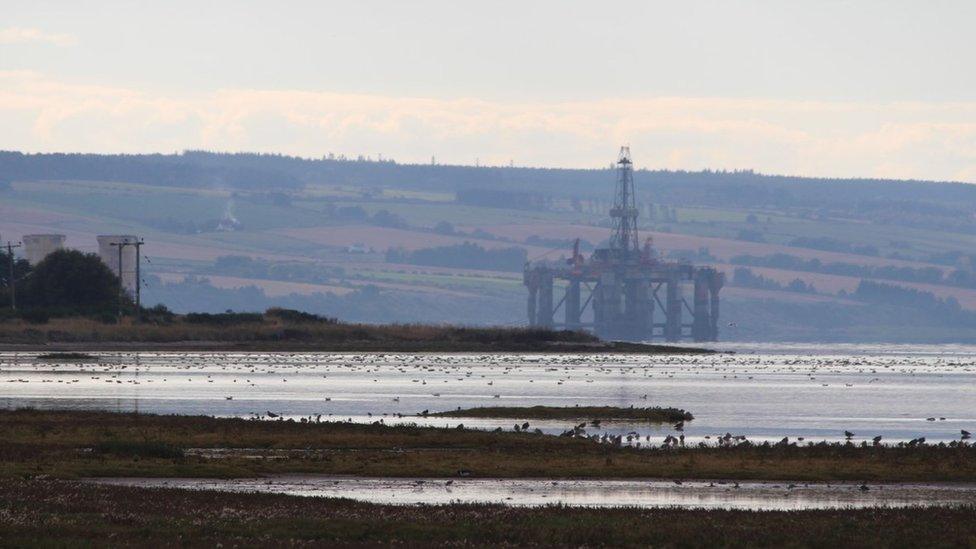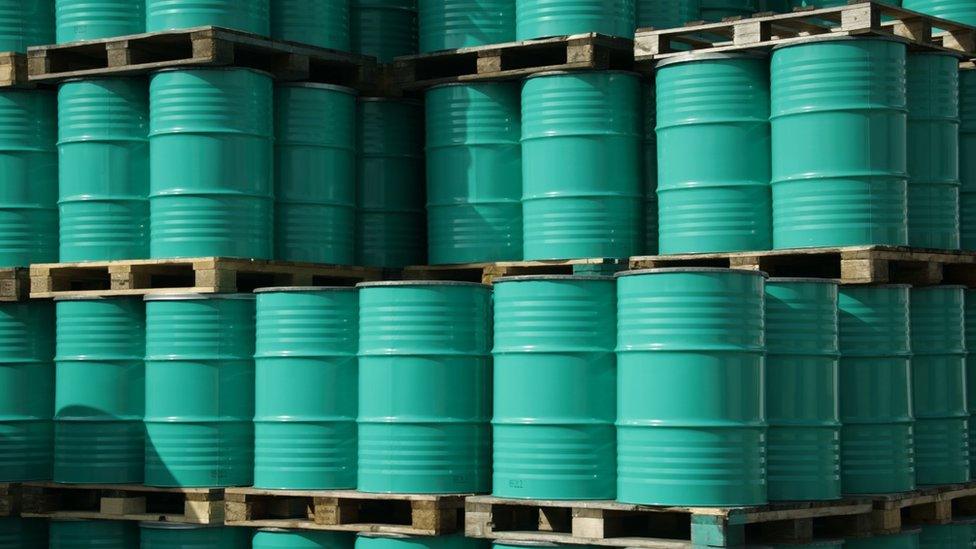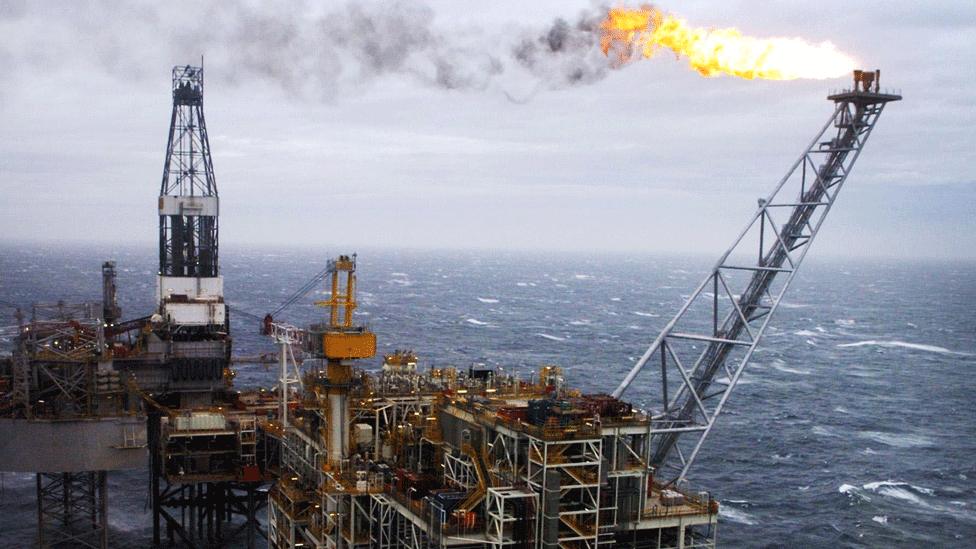Offshore oil's gusher of cutbacks and losses
- Published

There are pleasant surprises for Britain's oil and gas industry from its annual activity survey.
1 Output increased by nearly 10% last year - far more than expected, and after steep declines in recent years. It's expected to rise another 2.3% this year.
2 More than half of exploration wells were successful in 2015 - the best hit rate for 10 years, and with bigger finds than in the previous three years.
3 Cost-cutting was ahead of plan. Whereas falling production and 10% annual inflation for four years had driven up the cost per barrel extracted, the reverse was true with rising production and a sharp cut in industry pricing.
For instance, the cost of the average exploration well fell from £44m to £30m in only one year.
The average cost of producing a barrel of oil from British waters is on track to fall by 42% in only two years.
Spudded wells
There. That upbeat list didn't take long. The unpleasant bits for the industry are somewhat less surprising, and the list is rather longer.
For a start, at the current rate of investment in UK waters, production is expected to peak in 2018, and then fall sharply. Between 2015 and 2025, without a new wind of investment, it looks like being halved.
Then, the relatively successful exploration effort was based on only 13 wells spudded (or sunk), and looks good relative to three dismal years.
Cost cutting was achieved through a savage cut in jobs and pay rates, with more certain to follow.
It is seen by some as a sign of success that the industry spent £5bn less in 2015 than in the previous 12 months. But that represents a loud and rude sucking noise of activity being withdrawn from the economy.
As for the output increase, it was offset by a much sharper fall in revenue. Because the North Sea is an expensive place to operate, a lot of production now has higher operating costs per barrel than the price of a barrel.
At current prices, that's true of 40% of UK fields, 15% of total production (about 240,000 barrels per day), and a third of companies.
And those are just the flipsides of the positive news.
Startling stats
This 60-page report is the fullest picture we can expect of the industry's troubles during last year, and its expectations of what to expect in 2016 and a bit beyond.
Most of it makes grim reading for those people (more than 350,000, it is claimed) whose livelihoods depend on the sector. And it does so without compensating upsides.
One of the more startling statistics is that some of the sharpest pain is being felt away from the frontline and the offshore frontier, in the supply chain.

That saw revenue fall by about a quarter last year. In engineering, procurement, construction and installation, that is on track to be a 50% decline by the end of 2016.
These are businesses with high value, high quality jobs. Oil and Gas UK, the trade body which compiled this report, has special concerns about it.
"Many businesses will not be able to sustain falling revenues for much longer," we are told. "Actions the industry takes now will determine the future of the UK offshore supply chain for many years to come."
Reserves cut
Much of this, as you'll be well aware, has to do with the sharp fall in the price of oil, and a less steep decline in the price of gas.
It has hit hard at every aspect of the industry. Investment plans being approved are expected to drop from an average annual £8bn in recent years to less than £1bn.
Producers have told Oil and Gas UK that they have removed 1.55 billion barrels from their estimated reserves of commercially viable, recoverable oil (or its gas equivalent). That's more than 10 times more than was discovered last year.
The net effect, including some new projects, is a decline in reserves considered to be either probable or possible from 10 billion barrels to 8.8 billion.
When claims are made of up to 23 billion barrels still out there for the taking, and a more realistic possibility of 15 billion, much of that has yet to be discovered (Oil and Gas UK has lowered the maximum potential reserves to somewhere short of 20 billion).
In 2014, offshore producers told their industry representatives that they had 120 brownfield developments (extending the life of existing offshore fields) which had yet to be sanctioned for capital investment. That has fallen to only 49, in only a year.
Not well
They could add to that number if they invested in drilling to find where the next prospects are. But only seven to 10 exploration wells are planned for this year.
And at the next stage - after finding some oil - of drilling to appraise its significance, it will see only six to nine wells drilled.

The North Sea industry has struggled amid low oil prices
The third stage, drilling development wells, such as side-tracks which extend the reach of existing platforms, has been holding up much more strongly, with 129 projects last year.
For smaller companies in particular, the finance to keep drilling is in short supply. They reported 34 wells that were not drilled for that reason.
The industry expects to keep spending a lot of money on investment, but much of that is carried over from projects sanctioned in the boom years.
Some £6.1bn to be spent this year was approved before the price fell. It's not being replaced by newly-sanctioned projects. Another £4.6bn this year is reckoned to be essential to maintaining production.
Clean-up postponed
What this report spells out is a daunting confluence of factors - not just the sharp fall in prices, but the "super-maturity" of the UK offshore industry.
"Thirty years ago," it observes, "the industry was producing double the current rates from around quarter the number of current fields and, on average, discoveries were five times their current size."
The average field in the mid-1980s, was producing 75,000 barrels per day. The average now is 5,000 barrels.
But at least one big business opportunity that beckons is decommissioning of all that offshore equipment. The latest estimate from Oil and Gas UK is that it will cost £50bn by 2055.
And yes, activity is increasing - spending is more than £1bn per year - but not nearly as fast as expected.
While fields are shutting down - more than 100 of them between 2015 and 2020, up by a fifth - oil companies are holding off from the high costs of removing those platforms and pipelines.
Indeed, it's claimed that some are finding it more attractive to keep producing at a loss than face up to a very big bill for cleaning up and clearing out.
- Published23 February 2016
